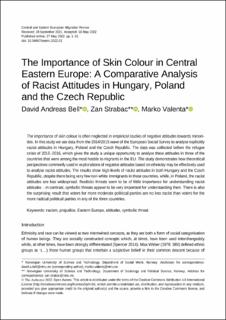The Importance of Skin Colour in Central Eastern Europe: A Comparative Analysis of Racist Attitudes in Hungary, Poland and the Czech Republic
Peer reviewed, Journal article
Published version
Permanent lenke
https://hdl.handle.net/11250/3037775Utgivelsesdato
2022Metadata
Vis full innførselSamlinger
Sammendrag
The importance of skin colour is often neglected in empirical studies of negative attitudes towards minorities. In this study we use data from the 2014/2015 wave of the European Social Survey to analyse explicitly racist attitudes in Hungary, Poland and the Czech Republic. The data was collected before the refugee crisis of 2015–2016, which gives the study a unique opportunity to analyse these attitudes in three of the countries that were among the most hostile to migrants in the EU. The study demonstrates how theoretical perspectives commonly used in explorations of negative attitudes based on ethnicity may be effectively used to analyse racist attitudes. The results show high levels of racist attitudes in both Hungary and the Czech Republic, despite there being very few non-white immigrants in these countries, while, in Poland, the racist attitudes are less widespread. Realistic threats seem to be of little importance for understanding racist attitudes – in contrast, symbolic threats appear to be very important for understanding them. There is also the surprising result that voters for more moderate political parties are no less racist than voters for the more radical political parties in any of the three countries.

